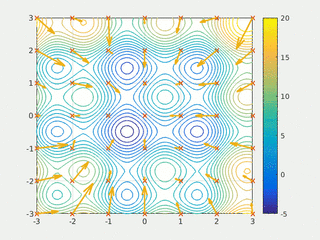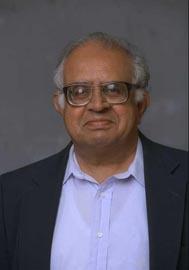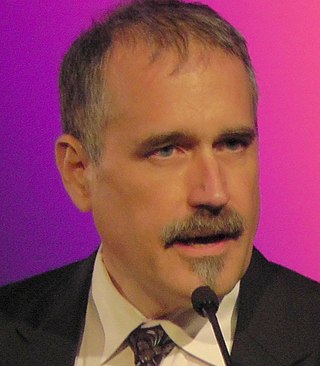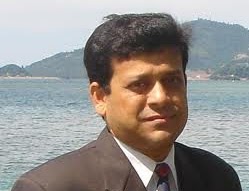Related Research Articles

In computer science, evolutionary computation is a family of algorithms for global optimization inspired by biological evolution, and the subfield of artificial intelligence and soft computing studying these algorithms. In technical terms, they are a family of population-based trial and error problem solvers with a metaheuristic or stochastic optimization character.

In computational science, particle swarm optimization (PSO) is a computational method that optimizes a problem by iteratively trying to improve a candidate solution with regard to a given measure of quality. It solves a problem by having a population of candidate solutions, here dubbed particles, and moving these particles around in the search-space according to simple mathematical formula over the particle's position and velocity. Each particle's movement is influenced by its local best known position, but is also guided toward the best known positions in the search-space, which are updated as better positions are found by other particles. This is expected to move the swarm toward the best solutions.

Marco Dorigo is a research director for the Belgian Funds for Scientific Research and a co-director of IRIDIA, the artificial intelligence lab of the Université Libre de Bruxelles. He received a PhD in System and Information Engineering in 1992 from the Polytechnic University of Milan with a thesis titled Optimization, learning, and natural algorithms. He is the leading proponent of the ant colony optimization metaheuristic, and one of the founders of the swarm intelligence research field. Recently he got involved with research in swarm robotics: he is the coordinator of Swarm-bots: Swarms of self-assembling artifacts and of Swarmanoid: Towards humanoid robotic swarms, two swarm robotics projects funded by the Future and Emerging Technologies Program of the European Commission. He is also the founding editor and editor in chief of Swarm Intelligence, the principal peer-reviewed publication dedicated to reporting research and new developments in this multidisciplinary field.
The expression computational intelligence (CI) usually refers to the ability of a computer to learn a specific task from data or experimental observation. Even though it is commonly considered a synonym of soft computing, there is still no commonly accepted definition of computational intelligence.
In artificial intelligence, artificial immune systems (AIS) are a class of computationally intelligent, rule-based machine learning systems inspired by the principles and processes of the vertebrate immune system. The algorithms are typically modeled after the immune system's characteristics of learning and memory for use in problem-solving.
Kalyanmoy Deb is an Indian computer scientist. Deb is the Herman E. & Ruth J. Koenig Endowed Chair Professor in the Department of Electrical and Computing Engineering at Michigan State University. Deb is also a professor in the Department of Computer Science and Engineering and the Department of Mechanical Engineering at Michigan State University.

Jacek M. Zurada is a Polish engineer who serves as a Professor of Electrical and Computer Engineering Department at the University of Louisville, Kentucky. His M.S. and Ph.D. degrees are from Politechnika Gdaṅska ranked as #1 among Polish universities of technology. He has held visiting appointments at Swiss Federal Institute of Technology, Zurich, Princeton, Northeastern, Auburn, and at overseas universities in Australia, Chile, China, France, Germany, Hong Kong, Italy, Japan, Poland, Singapore, Spain, and South Africa. He is a Life Fellow of IEEE and a Fellow of International Neural Networks Society and Doctor Honoris Causa of Czestochowa Institute of Technology, Poland.

Rangasami Lakshminarayan Kashyap was an Indian applied mathematician and a Professor of Electrical Engineering at Purdue University.

Alan Conrad Bovik is an American engineer, vision scientist, and educator. He is a professor at the University of Texas at Austin (UT-Austin), where he holds the Cockrell Family Regents Endowed Chair in the Cockrell School of Engineering and is Director of the Laboratory for Image and Video Engineering (LIVE). He is a faculty member in the UT-Austin Department of Electrical and Computer Engineering, the Machine Learning Laboratory, the Institute for Neuroscience, and the Wireless Networking and Communications Group.

Roberto Battiti is an Italian computer scientist, Professor of computer science at the University of Trento, director of the LIONlab, and deputy director of the DISI Department and delegate for technology transfer.

Pietro Perona is an Italian-American educator and computer scientist. He is the Allan E. Puckett Professor of Electrical Engineering and Computation and Neural Systems at the California Institute of Technology and director of the National Science Foundation Engineering Research Center in Neuromorphic Systems Engineering. He is known for his research in computer vision and is the director of the Caltech Computational Vision Group.
Josef KittlerFREng is a British scientist and Distinguished Professor at University of Surrey, specialising in pattern recognition and machine intelligence.
Saman Halgamuge was educated in Germany and Sri Lanka and he is currently a Professor of University of Melbourne, Australia. He is an elected Fellow of Institute of Electrical and Electronics Engineers, USA. He is a highly cited expert in his field and listed as one of the top 2% cited experts for AI and Image Processing in the Stanford University Database published in 2020. His most-cited paper being Self-organizing hierarchical particle swarm optimizer with time-varying acceleration coefficients, with over 3300 citations, according to GoogleScholar. He is a Distinguished Speaker/Lecturer on Computational Intelligence appointed by IEEE. He has supervised 45 PhD scholars to completion and delivered over 50 keynotes at International and national conferences.
Daniel Mier Gusfield is an American computer scientist, Distinguished Professor of Computer Science at the University of California, Davis. Gusfield is known for his research in combinatorial optimization and computational biology.
Yuhui Shi is a pioneer in particle swarm optimization algorithms and the developer of brain storm optimization algorithms. He was an electrical engineer from Xi'an Jiaotong-Liverpool University in Suzhou, China, where he was named a Fellow of the Institute of Electrical and Electronics Engineers (IEEE) in 2016 for his contributions to particle swarm optimization algorithms. He earned his PhD in electrical engineering from Southeast University, Nanjing, China in 1992, and was trained as a Post Doc Fellow at Concordia University under Canadian International Development Agency joint doctoral program, initiated by Prof. Jeremiah F. Hayes et al. He organized the first IEEE Symposium on Swarm Intelligence in 2003, and established the IEEE CIS Task Force on Swarm Intelligence in 2002, when he co-authored a book with James Kennedy and Russell C. Eberhart. He is a Chair Professor in the Department of Computer Science and Engineering, Southern University of Science and Technology (SUSTech), Shenzhen, China, where he invited Prof. Jun (Steed) Huang, from the Joint Institutes of Carleton University and the University of Ottawa, for a collboration on swarm intelligence robotics.

Ujjwal Maulik is an Indian computer scientist and a professor. He is the former chair of the Department of Computer Science and Engineering at Jadavpur University, Kolkata, West Bengal, India. He also held the position of the principal-in-charge and the head of the Department of Computer Science and Engineering at Kalyani Government Engineering College.
Jiebo Luo is a Chinese-American computer scientist, the Albert Arendt Hopeman Professor of Engineering and Professor of Computer Science at the University of Rochester. He is interested in artificial intelligence, data science and computer vision.
Donald C. Wunsch II is Mary K. Finley Distinguished Professor of computer engineering at the Missouri University of Science and Technology, and a Fellow of the Institute of Electrical and Electronics Engineers He is known for his work on " hardware implementations, reinforcement and unsupervised learning".

Douglas Henry Werner is an American scientist and engineer. He holds the John L. and Genevieve H. McCain Chair Professorship in the Penn State Department of Electrical Engineering and is the director of the Penn State University Computational Electromagnetics and Antennas Research Laboratory. Werner holds 20 patents and has over 1090 publications. He is the author/co-author of 8 books. According to Google Scholar, his h-index is 79 with more than 26,600 citations. He is internationally recognized for his expertise in electromagnetics, antenna design, optical metamaterials and metamaterial-enabled devices as well as for the development/application of inverse-design techniques.

Tingwen Huang, a Fellow of The World Academy of Sciences (TWAS) and a Member of the European Academy of Sciences and Arts.
References
- ↑ "2015 elevated fellow" (PDF). IEEE Fellows Directory.
- ↑ "P. N. Suganthan's Homepage". www.ntu.edu.sg.
- ↑ "Dr. P. N. Suganthan - Google Scholar Citations". scholar.google.com.au.
- ↑ https://wis.ntu.edu.sg/webexe88/owa/TDR_TELDIR.NAME_SEARCH%5B%5D
- ↑ "Profile: Ponnuthurai N. Suganthan". ResearchGate .